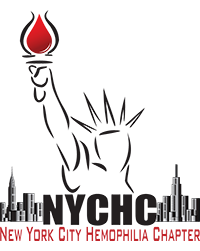Juno is Coming! Be prepared!
The four stages: Prevention, Preparedness, Response and Recovery
• Have both an individual and family/household preparedness plan
• Know your children’s schools’ emergency plans, your work and home care emergency plans
• Designate a central meeting place where all family members can find each other—a rendezvous point
• Create a telephone check-in point with an out-of-town relative in case phone lines are not working locally
• Provide your out-of-town contact information to your HTC and chapter; keep this contact info updated
• Know your exit points both at home and at work/school and how much time you need to get out. Prepare for any physical challenges that you or other family members may have
• Footwear—make sure you have comfortable footwear at your workplace/home or in your car in case evacuation is necessary
• Have an extra supply of medicine—not just factor but all necessary medications
• Have a full gas tank and extra water, food, clothes, diapers, flashlight, batteries, cell phone charger (car adapter and 110 volt), camp stove with proper fuel, fans/heater, generator, etc., ready at all times
• Have a way to charge your cell phone without electricity
• Program your emergency contact into your cell phone under “ICE” (In Case of Emergency) so emergency responders know whom to call if needed
• Gather your important documents, each family member’s medical records and insurance information in a secure, waterproof container to put in your go-bag
• Have a go-bag ready with your important documents, extra factor and other medications
• Have NHF’s HANDI phone number and Web site in your go-bag: 1-800-42-HANDI, www.hemophilia.org
• Practice your emergency plans both at home and at work; make sure there is a yearly orientation for everyone and brief any new employees. In both your home and work setting, know who has which responsibilities: who will get the factor, who will get medical records and know where these things are all located (in your go-bag)
• Review communication pathways
• Form a block or neighborhood association, discuss preparedness and general security for the area, and establish a network for looking in on neighbors
• Make sure your HTC knows where you will go in an evacuation and that you know its emergency plan as well
• Stay healthy—sound body, sound mind will serve you well in an emergency and everyday. Practice staying as healthy as you can—Do the 5!
• Practice your individual plan and then review for improvements and practice again with the improvements
Response
• If officials tell you to evacuate, evacuate early!
• Notify your HTC and chapter as to where you are heading
• Activate all the steps you have practiced with your family/household and at your work place
• Assist neighbors according to your neighborhood association planning
Recovery
• Make sure you have several ways of communicating in case you get separated from any family members or need to reach your HTC or homecare company
• Contact your chapter and HTC when the event is over and you have returned home (if you have evacuated previously)
Psychosocial Preparedness
• If your life is in balance before, it’s much easier to maintain balance during and after a crisis
• Post Traumatic Stress Disorder (PTSD) is real—know the signs, it can happen to both consumers and providers
• All people in a crisis may have delayed onset of symptoms or varying duration of symptoms
• PTSD has age-specific features, e.g., children may become quiet, engage in repetitive play, have nightmares, psychosomatic complaints, difficulty concentrating, show diminished interest in activities, exhibit regression to earlier stages of development, etc.
• Being prepared is the best therapy
• Caregivers and family members need to recognize their own needs, set limits and take time to care for themselves
• After the event, participate in your chapter and/or HTC debriefings regarding everyone’s response to the emergency.
1-800-42-HANDI www.hemophilia.org

